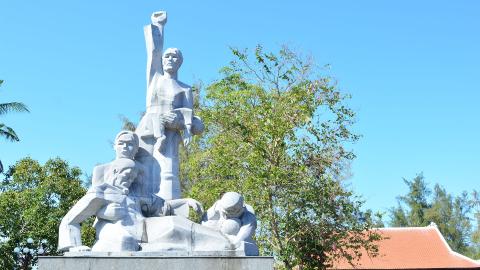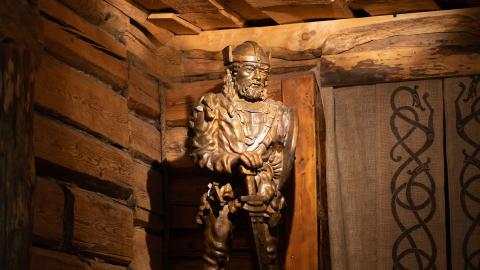Who were the original 102 passengers on board the Mayflower?
The voyage of the Mayflower to the New World was a long, gruelling and often painful one. Her passengers huddled within the leaking, cramped, storm-lashed ship, enduring seasickness and uncertainty for 10 long weeks before they landed at modern-day Massachusetts. But, while the reality of the journey may have been far from glamorous, the story of the passengers and the colony they founded has become one of the most fabled origin stories of the United States. So much so, many pride themselves on being descendants of the roughly 132 people who set sail from Plymouth, Devon.
In a time when all of us can easily start charting the histories of our families using Ancestry, it’s particularly tantalising to know that around 35 million people around the world can trace their lineage back to the Mayflower passengers. But just who were these intrepid voyagers whose lives would steer the course of the continent they risked their lives to reach?
A good proportion of the passengers were radical Puritan separatists, who – disenchanted with the Protestant Reformation and the Church of England – wanted to establish a new community where they could live without fear of persecution. One of these Puritans was William Brewster, a former postmaster from Nottinghamshire whose own home became a refuge and place of worship for fellow Puritans. Brewster, who had been educated at Cambridge and worked for a time alongside one of Elizabeth I’s diplomats, eventually led some of his followers to a new life in Holland, which was known for its more accepting religious climate.
Once there, Brewster published incendiary books that agitated against the Church of England, making him a marked man in the eyes of the English ruling elite. Somehow managing to evade being arrested and punished, Brewster would become the elder religious leader of the Mayflower Pilgrims, described by a fellow Puritan as ‘tender-hearted and compassionate’.
He travelled on the ship alongside his wife Mary Brewster and sons Love and Wrestling Brewster. His daughter Patience Brewster would join the family in the New World a few years later – one of her direct descendants was the iconic crooner and film star Bing Crosby. Another daughter, Fear, arrived with Patience, and one of her descendants was the 12th US President, Zachary Taylor. Other well-known people who can trace their lineage back to the Brewsters include Hollywood star Richard Gere and Family Guy creator Seth MacFarlane.
A particularly prominent Puritan on board the Mayflower was William Bradford, who hailed from Yorkshire and had been a member of Brewster’s renegade congregation in Nottinghamshire. Like Brewster, Bradford also lived in Holland for a time, before the pivotal voyage to America took place. Bradford was a key member of exploration parties who set off to explore possible locations for a settlement while others stayed behind on the anchored Mayflower. It was while he was away on one of these reconnaissance trips that his wife Dorothy fell overboard and drowned.
Bradford would go on to become a Governor of Plymouth Colony and write the most famous account of the Pilgrims’ early years (which would earn him the accolade the 'father of American history'). He would also remarry, to another Pilgrim named Alice. Through one of their sons, William and Alice are the distant ancestors of movie stars Clint Eastwood and Christopher Reeve, and of photography entrepreneur George Eastman, founder of the Kodak company. One of the most noteworthy Mayflower passengers wasn’t a Puritan at all. He was Myles Standish, a soldier – possibly from Lancashire – who was hired by the Pilgrims to be their military coordinator in the New World. This proved to be a sound investment, as Standish proved a tough and resourceful explorer, forming a close working partnership with William Bradford and keeping morale up during the first harsh winter which saw many of the Pilgrims die – including Standish’s own wife Rose.
Known for his fiery personality, Standish played a decisive role in securing the colony and both negotiating with, and battling against, indigenous tribes. Another reason his name has stayed with us over the centuries is his starring role in a 19th Century poem, The Courtship of Miles Standish, by Henry Wadsworth Longfellow. This highly romanticised chronicle of the Mayflower adventure focuses on a supposed love triangle involving Standish and two other passengers, John Alden and Priscilla Mullins, whose descendants would be among the most important in US history.
Alden, whose place of birth in England is unclear, had been hired to be a crewman on the Mayflower. Priscilla Mullins, of Surrey, travelled on the Mayflower with her father – a prominent businessman – and other members of her family, all of whom perished soon after they settled in the New World. Although Longfellow’s poem is generally dismissed as complete fiction, John Alden and Priscilla Mullins were indeed wed – Longfellow himself was one of their descendants through their daughter Elizabeth.
Meanwhile, through another daughter named Ruth, John and Priscilla’s lineage would include John Adams, Founding Father and second US President, and John Quincy Adams, the sixth US President. The sheer number of people alive today whose genetic roots can be traced back to the Mayflower’s passengers means that interest in the ship remains as high as it’s ever been, with the Mayflower Society an active organisation committed to researching the descendants of the Pilgrims. If this has helped inspire a curiosity about your own family tree, why not use Ancestry’s resources to find out more? After all, while the Archives on Ancestry don’t stretch as far back as the Mayflower, there’s no telling what revelations lie in wait when you start piecing together the secrets of your family’s past.
















